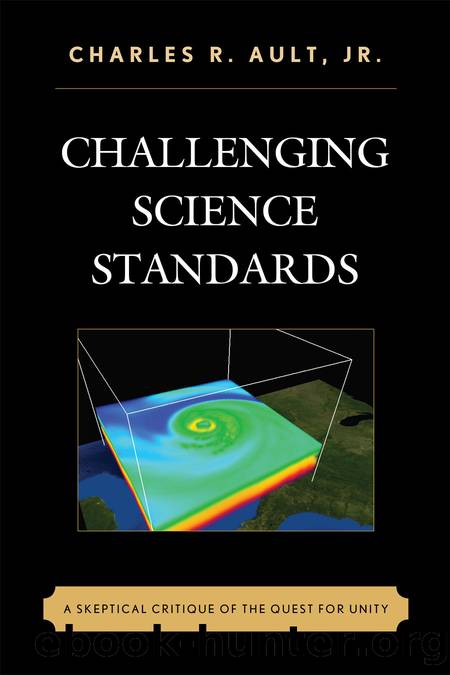Challenging Science Standards by Ault Charles R. Jr.;

Author:Ault, Charles R., Jr.;
Language: eng
Format: epub
ISBN: 9781475818499
Publisher: Rowman & Littlefield Publishers
Published: 2015-08-08T00:00:00+00:00
FALSE RIGOR
In the earthquake machine example, generic aims, given the force of state policy defining scientific inquiry, undermined good teaching at the middle-school level. The study of landforms in elementary school prioritized stereotypical science and failed to help children interpret their own surroundings sculpted by Ice Age meltwater. Stereotypical experimentation dominated instruction in both situations, rather than a valid portrayal of how geoscientists interpret landscapes.
Monitoring school progress coupled to the desire to promote equity inexorably brings pressure to adopt standards that unifyâstandards that standardize what to teach. As a result, imaginative, diverse science teaching struggles for legitimacy. If students are not learning the same thing, how are we to compare them? Such supposedly self-evident logic dismisses questions of fundamental importance about the role of disciplinary diversity in school science. Ease of comparing student outcomes comes at a high price: misrepresenting the diversity of the sciences, eclipsing opportunities to ground science teaching in local landscapes, and silencing studentsâ own questions.
The value of the knowledge serving the lives people live, not training in unityâs dogma, ought to determine the answer to âWhat to teach?â In proper context, disciplinary toolsâconcepts and practicesâserve purposeful ends inseparable from community interests, such as augmenting community resilience in the face of disaster. In a purposeful context, high-level abstractions may flourish alongside personal interest.
The unifying dimensions of the NGSS detour the ascent through disciplined knowledge, divorce inquiry practices from understandings of the phenomena they target, and devalue interests that are timely, local, particular, and personal. The proper context for learning science is a particular problem, not the big ideas common to all the sciences. If the diversity of such contexts creates assessment headaches, so be it.
The science standards contain the statesâ answers to âWhat to learn?â Challenging the science standards begins with asking a more fundamental question: âWhat to value?â Silencing the value question promotes consensus, which enables a political agenda. The silencing, as D. Bob Gowinâs epigraph warns, also promotes false knowledge and encourages a debilitating rigor. The knowledge is false because it misrepresents the diversity of scientific practices and downplays how inquiry intertwines with understanding. Assessment debilitates learners by divorcing propositional knowledge from corresponding methods of inquiry. The science standards movement promises only a false rigor, a false rigor that enables assessment.
Download
This site does not store any files on its server. We only index and link to content provided by other sites. Please contact the content providers to delete copyright contents if any and email us, we'll remove relevant links or contents immediately.
The Art of Coaching Workbook by Elena Aguilar(51199)
Trainspotting by Irvine Welsh(21666)
Twilight of the Idols With the Antichrist and Ecce Homo by Friedrich Nietzsche(18632)
Fangirl by Rainbow Rowell(9250)
Periodization Training for Sports by Tudor Bompa(8273)
Change Your Questions, Change Your Life by Marilee Adams(7782)
This Is How You Lose Her by Junot Diaz(6887)
Asking the Right Questions: A Guide to Critical Thinking by M. Neil Browne & Stuart M. Keeley(5775)
Grit by Angela Duckworth(5615)
Red Sparrow by Jason Matthews(5473)
Paper Towns by Green John(5191)
Room 212 by Kate Stewart(5121)
Ken Follett - World without end by Ken Follett(4732)
Housekeeping by Marilynne Robinson(4447)
The Sports Rules Book by Human Kinetics(4386)
Papillon (English) by Henri Charrière(4274)
Double Down (Diary of a Wimpy Kid Book 11) by Jeff Kinney(4272)
The Motorcycle Diaries by Ernesto Che Guevara(4101)
Exercise Technique Manual for Resistance Training by National Strength & Conditioning Association(4071)
